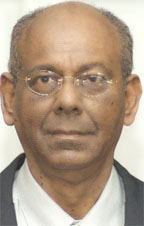-Ramkarran
The restoration of Cabinet’s decision-making authority could dispel unease about the powers of the President, according to Speaker Ralph Ramkarran.
“…This, more than anything else done so far, will formally reduce the President’s powers by making him/her primus inter pares (the first among equals),” he writes in his column in the Weekend Mirror, explaining, “It would mean that the Cabinet can formally defeat a proposal or initiative by the President which it cannot now do.”

According to Ramkarran, when confronted with the reality of reducing the powers of the President, the Constitu-tion Reform Commission (CRC) had discovered that not a great deal could be done within the context of a presidential system. During the reform process, he explains, the South African Constitu-tion had been used as the model and like ours it provides that the President is the chief executive, commander-in-chief and head of the cabinet, which are the main sources of presidential authority. In addition, the South Africa Constitution also enables its President to issue executive orders and proclamations.
Nevertheless, he says the CRC recommended the amendment of some articles to reduce the powers of the President and they were implemented by the National Assembly. The amendments, which he dubbed “substantive,” included the transfer of the power of appointment of constitutional commissions from the President to the National Assembly, the transfer of responsibility for supervision of the work of the Auditor General from Government to the National Assembly and the removal of the President’s discretionary authority over pensions. Additionally, he cites the strengthening of the methodology of consultation between the President and the Leader of the Opposition.
However, Ramkarran observes that the amendments “have not satisfied the critics. They complain still about the President’s ‘enormous’ powers and urge a slash and burn approach, as if their objective is to denude the presidency of any authority,” he says. At the same time, he argues that “more can be done to assuage public opinion which still recoils from the experiences of the era of the maximum leader for whom, it is popularly believed, the post was designed.” In this context, he notes that the President, even though he/she is the chief executive, “cannot exercise that executive authority in a formal way as the South African President, by issuing executive orders.” He suggests that this is the most likely reason why decisions in Guyana are made by the Cabinet although it “has
no executive authority and
is merely an advisory”
“constitutional body.”
Ramkarran argues that it “is an extra constitutional decision-making process and should be changed,” while noting that it can be done by restoring the decision making authority of the Cabinet and this, more than anything else done so far, will formally reduce the President’s powers by making him/her primus inter pares.”
In addition to the powers of the President, Ramkarran’s column also looks at the immunities of the President and inclusive governance, which he says are often raised in discussions about constitutional reform. He thinks the issue may be one of the talking points of the upcoming election campaign.
On the issue of immunities, he says that a minor modification was made in the immunities provided by the Constitution for the President because there was no agreement otherwise. However, he feels that the immunities of the President are extensive and unnecessary. Ramkarran notes that there has been continuing criticism of immunities that virtually absolve the President from all civil or criminal liability, in pursuance of his duties and in his/her personal capacity, for life. He says all that is necessary to protect a President is immunity from liability for acts done in the course of performing his/her duty, which is captured by Article 182(1). He adds that Article 182(2), which protects the President from acts done in his/her private capacity, should be repealed. Further, he makes a similar recommendation for Article 182(3), which protects a former President from a limitation of time to institute proceedings. “These two proposals might not be the only ones that are possible but they are substantial enough to impact significantly on the powers of the President and should attract public support even though the debate is unlikely to end,” he argues.
Meanwhile, Ramkarran says the issue of inclusive governance focused on enshrining shared governance in the constitution. He recalls that the CRC did not agree because the majority of members did not support it and it was pointed out that shared governance can be effected without reform to the Constitution, providing the parties agree. The debate did, however, produce the recognition that stronger mechanisms needed to be put in place to ensure more inclusive governance, resulting in the “non-justiciable provision,” Article 13. Article 13 states: The principal objective of the political system of the State is to establish an inclusionary democracy by providing increasing opportunities for the participation of citizens, and their organisations in the management and decision-making processes of the State, with particular emphasis on those areas of decision-making that directly affect their well-being.”
Ramkarran writes that shared governance is a political issue, not a constitutional one. “Unless there is political agreement, it is unlikely that there would be constitutional reform to introduce shared governance,” he says, while adding that constitutional reform is not necessary for a coalition government. However, he adds that it would be possible to amend Article 13 to particularise the “groups of citizens” who are to be consulted in the management and decision-making processes of the state, as well as the areas of decision-making. “This Article can then be made justiciable so that the groups which are granted the right to be consulted can institute legal proceedings if they are not and for the decision to be stayed while their case is pending,” he emphasizes, saying it would be a major advance in constitutional protection for groups of people who are offered such protection, in addition to the constitutional commissions and parliamentary sectoral committees that were created.




